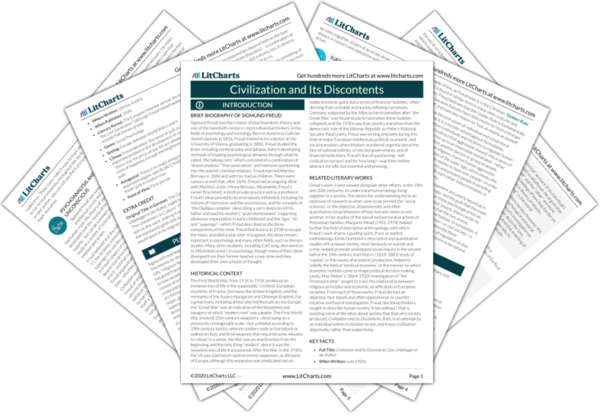Summary
Analysis
In this chapter, Freud seeks out the psychological bases of communal life—why did humans beings first feel the need to join together in groups? For Freud, the answer lies in human male-female sexuality. “Stronger” men found that, by “keeping” women closer to them—by living with them and raising biological families with them—they could each satisfy what Freud identifies as the two initial human imperatives—love (eros) and necessity (or basic items like food, water, shelter, and clothing—Freud also calls this “ananke,” from the Greek word for “need”). Women, for their part, looked to men for protection from violence and for satisfaction of sexual and procreative desires. Thus civilizations began with these first family units.
Freud’s arguments in this chapter are perhaps the most far-flung and tenuous in the book, but they are still of interest in the analysis of his own thought. In other words, Freud’s ideas on human development show just how much importance Freud places on sexual desire, and man’s wish to secure that sexual desire in the future. Thus Freud envisions family units as, essentially, protective structures guaranteeing sexual desire and other basic needs. Human societies, in this line of reasoning, are necessarily built on male-female family units.
Themes
Freud then goes on a self-identified detour to investigate what exactly he means by love in this earliest human setting. For Freud, love is not inevitably bound up in happiness, but is instead a relationship of need, desire, and potential jealousy between two persons. Freud believes that the kind of love extolled in certain philosophies, especially the Christian religion—a love of all mankind, and the injunction to “love one’s neighbor as oneself” (the Golden Rule)—is an aberration, something nearly impossible for most humans to manage.
Freud clearly differentiates between the sexual love of the family units (in the passage above) and the Christian concept of universal love – the second being a kind of fellow-feeling, a generosity of spirit. For Freud, the first, sexual kind of love is not a generosity of spirit, but is a desire for one party to find, in another, a certain set of physical and mental satisfactions.
Themes
Freud investigates the “Golden Rule” in greater detail, arguing that it is an impractical injunction for two reasons. First, because “a love that does not discriminate seems to me to forfeit a part of its own value . . . and secondly, [because] not all men are worthy of love.” Freud instead believes that the concept of “love” in Christian discourse—and that often used by people in modern Europe—is actually two different sensations: the sexual love between man and woman, and the genetically-based familial love between children and parents. Freud believes that sexual love is the primary drive, and that genetically-based familial love is a kind of “inhibited” form of that sexual desire, one that is reinforced by incest taboos, barring people within families from sexual relations with one another.
One might anticipate Freud’s difficulty with the Golden Rule, and with Christian teachings regarding the love of others. In the Gospels, Christ argued explicitly that one ought to love other people not for what those people can do for one, but simply because love is itself an utmost good. For Freud, love cannot function in this way – love is not an end, in Freud, but is instead a drive, and therefore a means toward accomplishing things in the world. Love for Freud is the jealous, anxious, and powerful glue that binds humans together, creating families and societies.
Themes
Freud concludes the chapter by noting that sexual relations within societies are “impaired” by certain regulations, which tend to privilege monogamous, lifelong, male-female procreative unions, as contracted by marriage. These rules, Freud notes, are designed to maximize the smoothness of social functioning—because male-female family units are, in essence, the easiest for societies to replicate, and the easiest to govern. Freud acknowledges that a great deal of “variation” might occur from this norm within a society. For example, people might have sex with others of the same gender, or have sex outside marriage. Nevertheless, the social constraints against uninhibited love are significant, and constitute a foundation on which social control is constructed.
Freud’s notion of “impaired” sexuality is another controversial idea. For it is taboo is nearly all societies for people within the same family structure, whether biological or not, to engage in sexual activity. Indeed, one might argue that the “incest taboo,” as it is known, is a central organizing principle of human societies. Freud does not dispute this idea per se, but he does seem to argue that family love retains within it a sexual principle that is, of necessity, displaced and suppressed. It is a strange and disturbing argument.
Themes
Get the entire Civilization LitChart as a printable PDF.













